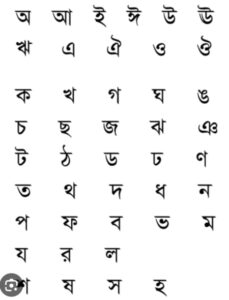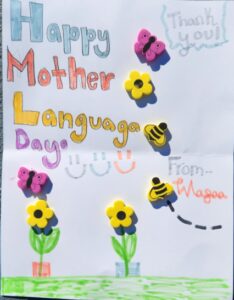As An International Mother Tongue, Bangla is Our Pride
প্রকাশিত হয়েছে : ৫:৩১:৫৯,অপরাহ্ন ২২ ফেব্রুয়ারি ২০২৪ | সংবাদটি ৫৪৯ বার পঠিত
Saniyah Mozumder
Dallas,Tx

“Bangladesh is a world of metaphor, of high and low theater, of great poetry and music. You talk to a rice farmer and you find a poet. You get to know a sweeper of the streets and you find a remarkable singer.” was what Jean Houston once said. And it could not be further from the truth. Bangla carries much meaning with few words, making every thing a person says sound like a song or poem. Aside from the rich culture that stems from the region, the struggle to make Bangla an official language and the prominent figures that popularized the beauty of it are what we should be proud of.
Bangla is the only language in the world that blood was shed for. The tension and drive for the language began in 1948, climaxing during the killing that took place on February 21, 1952. The leaders of Pakistan made Urdu the official language. This agitated the East Pakistanis, including the students. Professor Nurul Huq Bhuiyan, a prominent Bengali activist, held the first Rastrabhasa Sangram Parishad (Language Action Committee) toward the end of December, 1947 to help fight for the cause. On February 21, 1952, students held a gathering at the Dhaka University campus, violating orders that banned assembly. This led to a heated protest where police resorted to baton charge. It caused many deaths and wounded people, saddening the masses but only igniting their efforts. Their goal was finally achieved on Febuary 16, 1956 where the Pakistan Constituent Assembly unanimously agreed that Urdu and Bangla where the official languages of the country.

Many prominent figures showcase beauty that is completely encompassed using Bangla. The most famous of these figures is a household wonder to all those who come from Bengali descent: Rabindranath Thakur. A compilation of his best poems, Gitanjali, won him the Nobel Peace Prize of Literature. He was mostly known for his lyric poetry which usually incorporated nature and human life. According to Cambridge University Press, “Rabindranath’s poetry comprises a whole universe of themes and concerns.” A writer similar to Rabrindranath Thakur is Kazi Nazrul Islam. In fact, Thakur mentored him and helped him in his writing journey.

To this day, he is known as the national poet of Bangladesh (aka the Rebel Poet). His work covered freedom-fighting, Indian independence, and Bengali culture.
Showcased in the works of these outstanding poets and the sacrifice of the activists in East Pakistan, Bangla is something to honor. The actions and words of the people had a large weight on the decisions that changed the scope of history. In this day and age, where much of our culture is Westernized, youth must take the initiative to rediscover their roots and enrich their lives once more.
Saniyah Mozumder, Dallas,Tx





